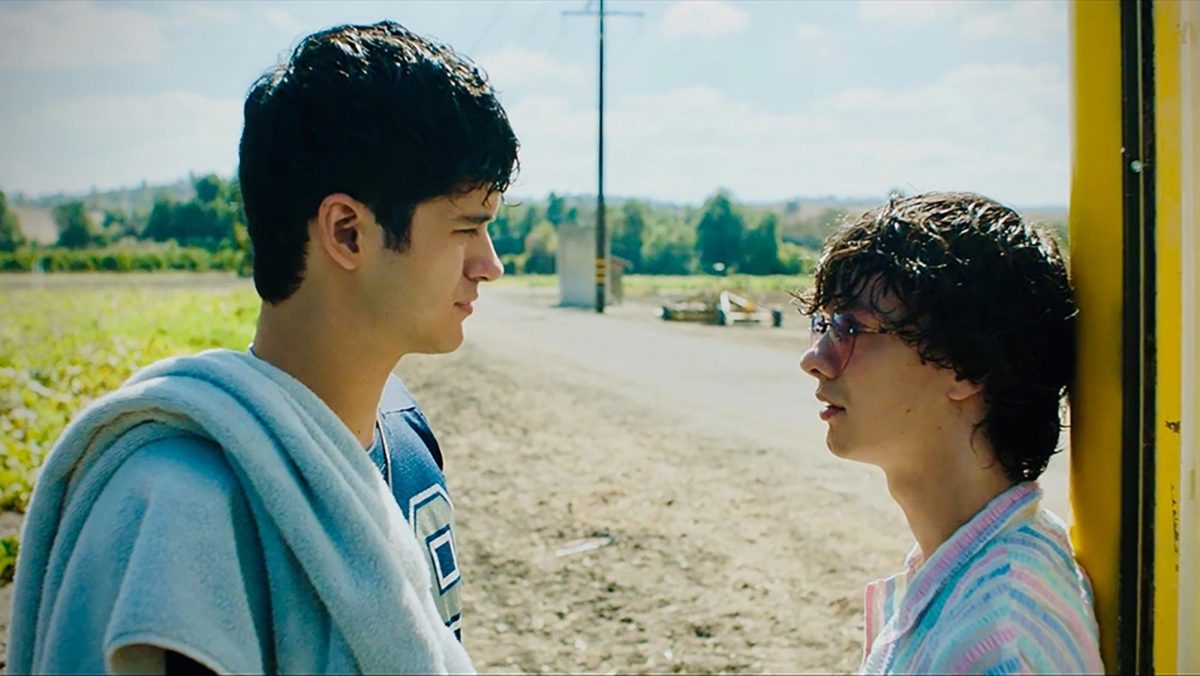Editor’s Note: This review does contain spoilers.
In a world that is now releasing more LGBTQIA+ stories, “Aristotle and Dante Discover the Secrets of the Universe” brings a refreshing and great take on the coming-of-age narrative.
Movies like “Red, White & Royal Blue” and “My Policeman” offer a very one-dimensional portrayal of what a queer lifestyle may be. These adaptations focus mainly on the sexual aspect of a relationship which is not entirely realistic.
The motion picture adaptation of the book of the same name, Aristotle and Dante brings more than a lustful relationship, but the metamorphosis of a brand-new friendship, something much healthier for younger audiences.
The movie had a tough road on getting made with writer and director Aitch Alberto; having a script drafted back in 2017. A script reading was held for Outfest, the LGBTQIA+ film festival, the following year which featured Blue Beetle’s Xolo Maridueña and Resse Gonzales. Gonzales would go to play the part of Dante in the final film alongside Max Pelayo as Aristotle, or Ari.
The film features songwriter Lin Manuel Miranda, actress Eva Longoria and Mexican actor Eugenio Derbez as producers. Both Longoria and Derbez star in the film as well.
“Aristotle and Dante Discover the Secrets of the Universe,” takes place in 1980s El Paso, adapts a lot of what was in the book which was written by local author Benjamin Alire Sáenz. However, several scenes were cut to meet its 96-minute runtime.
The biggest changes were not subtractions but carryovers from Sáenz’s sequel book “Aristotle and Dante Dive into the Waters of the Worlds.”
The movie touches upon the AIDS crisis that was plaguing gay men in the 1980s. This was not brought up in the book but was featured in a scene where Ari’s father is watching the news.
Another contrast was the addition of Ari’s lesbian aunt, Ophelia, played by Marlene Forte. Aunt Ophelia was mentioned throughout the first book, but never interacted with Ari in a face-to-face setting. Aunt Ophelia’s death serves as a way for Ari to become comfortable with the idea of being a gay man.
The inclusion of Aunt Ophelia in the movie helped sell Ari’s journey. Ari shares several scenes with his aunt where the audience is allowed to see the kind and gentle woman Ophelia is. These moments of character development which were absent in the book can make audiences more receptive to Ari’s ultimate resolution later in the film.
The biggest change, and what may be deemed as the most controversial change from page to screen, was Ari and Dante’s first kiss.
Although this scene plays out more or less the same in both iterations, it was Ari’s reaction that skewed drastically from the source material.
In the book, Dante coerces Ari into trying, “an experiment.” That experiment would involve the two boys kissing in Dante’s room. Ari is hesitant but goes along with Dante’s plan in an attempt to shut him up. His demeaner after the kiss is calm and put together simply telling Dante the kiss, “Didn’t work for me.”
The movie plays the moment nearly word for word up until the point after the kiss, except they are both outside Dante’s house and in Ari’s truck. Ari, out of sheer confusion, kicks out Dante from his car going as far as to call Dante a “freak.”
At the risk of sounding like a “book purest,” this change momentarily took me out of the movie as, even in the film itself, Ari’s reaction was out of character as he cared extremely for Dante.
This change, however, did not change my overall opinion of the film. Neither did it change for the writer himself as Sáenz explained to El Paso Matters.
“I’d give it a 9.5 out of 10,” Saenz said. “It’s a wonderful movie, but I had to take myself out of it when watching it. I had to watch it without focusing on my book. A movie is never a literal translation of the book, it’s not supposed to be.”
I think that this is an important note going into the film. I even caught myself saying, “This is not how it played out in the book.” I would snap out of that trance as I knew the film was doing a great job adapting a book that has become dear to many readers.
As positive LGBTQIA+ narratives filter more into a welcoming mainstream, I hope that others that may be going through something similar feel not just comfortable, but proud of who they are.
The Prospector may be reached at [email protected]





